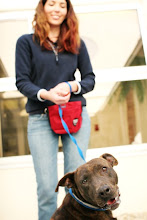 Is a puppy right for you? Are you ready for all of the responsibility? Remember, puppies need constant supervision and are a lot of maintenance!
Is a puppy right for you? Are you ready for all of the responsibility? Remember, puppies need constant supervision and are a lot of maintenance!Sure puppies are cute but....they go to the bathroom EVERYWHERE, they chew on EVERYTHING, including your favorite pair of shoes! Puppies nip and teethe and know very little of the world. Therefore it is up to you to teach them everything.
You already have a puppy? Start socialization right away! Puppy proof your home. If you don't want it chewed or peed on, don't let puppy have access to it. Set a routine and be consistent. Make sure to purchase the correct cleaning products. You'll want a non ammonia based product. I like to use simple white vinegar and baking soda. Have your puppy vaccinated and spayed or neutered!
Puppies need their families! A puppy should remain with its mother and siblings until at least 8 weeks of age. During this time, puppies learn valuable social skills like how to play and how to fight, and how hard is to hard to bite. (Bite inhibition)
Once you take over the role of teacher you MUST remember to socialize your puppy soon and often.
It is up to you! Puppies are 100% dependent! A puppies biggest danger is lack of education on the part of the owner. At the shelter, we receive thousands of puppies between the ages of 6-10 months every year. These puppies come in with little to no training. They were once cute little things with so much potential, but due to lack of training, arrive in our care as crazy 'out of control' large dogs who are now difficult to adopt out.
Did you know that some people even euthanize their pet due to behavior problems? Problems which could have been easily prevented with just a little work and effort. Behavior problems CAN be avoided! Remember what is cute today, may be obnoxious tomorrow!
Do NOT anthropomorphize! (Big word I know...) This just means don't place human emotions onto your dog. They don't poop on your rug while you're out because they are 'mad' or 'spiteful'. They pooped because they had to go!
Puppies may be small today, but will be big tomorrow! Make sure to set the rules and boundaries now. Decide what you want in an adult dog and begin shaping your puppy to meet your expectations.
Come back next time when we further discuss the importance of socialization and how to make sure your puppy listens to you!









